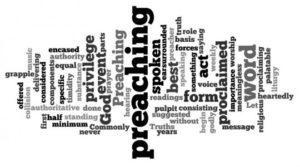
“Therefore I tell you, her sins, which are many, are forgiven- for she loved much. But he who is forgiven little, loves little.” (ESV Luke 7:47)
What is your estimation of yourself? I’m not speaking in terms of estimating your financial worth or estimating your value to others in this world. What is your estimation of yourself before God? Do you consider yourself “pretty good†or “a decent person†or “righteous compared with others� Or are you sinful? Are you one who has been greatly forgiven?
We must remember that the Bible teaches us that all fall short of the glory of God (Rom. 3:23). We are all conceived and born in sin, and therefore we have no righteousness before God from our very conception (Psa. 51). Not only that, but we have no interest or desire for God in our sinful condition, and so we sin against God in our words, thoughts and deeds (Gen. 6:5; Jeremiah 17:9; Eph. 2:1-3). The Bible tells us that our predicament is so sinful that even our best works of righteousness, our best prayers, our best goodness before God is as filthy rags worthy only of rejection before God’s holy face (Isa. 64:6).
If we are conceived in sin, and we constantly commit actual sins throughout our lives because we resist God and selfishly want to live for ourselves, and our best religious efforts are tainted by sin, and are never acceptable before God, what are we to do? How can we ever love God and others, if we find ourselves in this sinful predicament?!
Look to Jesus Christ who is the very righteousness of God! Jesus Christ is the full revelation of the righteousness God requires of all mankind, and Jesus Christ is the full and gracious revelation of the righteousness God provides for all who believe!
In Christ, by faith alone, we find the love of God and the forgiveness of sins.
“Come, ye sinners, poor and wretched,
Weak and wounded, sick and sore;
Jesus ready stands to save you,
Full of pity joined with pow’r:
He is able,
He is able,
He is able,
He is willing; doubt no more…â€[1]
This is why we must learn to estimate ourselves rightly before God. If we are ever to love Christ and others as we should, we need to estimate ourselves rightly. If we are ever to repent daily, in a manner consistent with our sinfulness, we need to estimate ourselves rightly before God. As we understand the great love and mercy and forgiveness of God in Jesus Christ, so we learn how much we are forgiven of our sins in Him and for His sake, and we learn how to love. In our passage from Luke 7 (vv. 36-50), we see Jesus as the Savior of sinners, seeking and saving the lost. Jesus accepts an invitation to go to a Pharisee’s house to reveal his dire need of a Savior from sinful self-righteousness.
A notoriously sinful woman (probably a prostitute) enters into Simon the Pharisee’s home, rushing toward the only person who can and will forgive her, and makes her humble submission to Jesus, showing her faith and love for Christ in her actions. This sinful woman knows that her only hope is found in the mercy of Jesus Christ.
Contrastly, the Pharisee Simon, with pride and prejudice, criticizes Jesus in his mind for not being a good prophet because he thinks Jesus is unaware of her sinful position and actions in the world (v. 39). Simon the Pharisee is unaware of His own need of the righteousness of God found in Christ alone (cf. Rom. 3:21-26). Simon compares himself with this notoriously sinful woman to puff himself up, and to find through comparison with another sinner a (self!) righteousness of his own making. This is how sinners often can deceive themselves. Rather than compare our hearts and thoughts with the perfect righteousness of God revealed in His holy law, we merely compare ourselves to sinners who are worse sinners than ourselves in our own estimation!
…Come, ye weary, heavy laden,
Bruised and broken by the fall;
If you tarry till you’re better,
You will never come at all:
Not the righteous,
Not the righteous,
Not the righteous,
Sinners Jesus came to call…
Yet because of this woman’s humility and right estimation of herself before a holy Christ, her “many sins†are forgiven by Jesus because she recognizes her sinfulness and comes to Jesus for help. The woman is not seeking to compare herself with other sinners who may be more wicked than her. Her attitude is not critical as Simon’s. Rather, she is concerned first with her own heart before God. This demonstrates true faith and repentance in Jesus Christ!
Jesus uses this story to show that all sinners are debtors to God, and if one truly understands their condemnation under God’s holy law, that is if they have a right estimation of themselves before God, then they will be humbled and realize their great debt to God that they cannot pay back, and cry out for “mercy!â€
Simon the Pharisee understands that the woman is showing great love for her debt being forgiven, but he doesn’t understand his own debt to God as a Law-breaker- -that he too, is a debtor with a large debt. Because of his pride, Simon doesn’t feel the weight of his need for Jesus. Simon doesn’t rightly estimate the greatness of his debt before God.
…Let not conscience make you linger,
Nor of fitness fondly dream;
All the fitness he requireth
Is to feel your need of him;
This he gives you,
This he gives you,
This he gives you;
‘Tis the Spirit’s rising beam.
It is important to note in Jesus’ story that it is not the love in action that brings the forgiveness from God. It is the cancellation of the sinful woman’s debt, the relief of her sinful burden that brings forth love and gratitude.
Jesus is not teaching that we are saved and forgiven by our love, but that our love shows that we have truly been forgiven!
Our love demonstrated through praise and worship of Christ, and the love of others reveals that we have a right estimation of ourselves before God, and that we realize we have been recipients of God’s grace and mercy- -apart from any works, or anything good that we have done.
The woman does not merit her forgiveness through her loving actions toward Jesus. Rather, she shows that she has been forgiven and because of the forgiveness she has already received by God’s grace through faith in Christ, she shows forth this forgiveness in true love.
Jesus says: “Therefore I tell you, her sins, which are many, are forgiven- for she loved much. But he who is forgiven little, loves little.” – v. 47.
Beloved, if we daily remembered how much we have been forgiven by God for our many sins, we would be more loving toward others, more worshipful before God, more humble-hearted, more service-oriented, more forgiving, less proud, less critical of others, less judgmental (Matt. 7:1-5). We would more easily consider others more significant than ourselves (Phil. 2:3ff; Rom. 12:3), and we would experience deeper repentance before God.
Do you find yourself growing in your understanding of just how much you have been forgiven? Do you find yourself seeing Christ as more lovely and beautiful as a Savior as you grow in understanding the depths of your sinful heart? Does this make your heart soar and your affections long to worship and please Christ alone?!
The Christian life is not about becoming more like Simon the Pharisee, full of self-righteousness and self-importance. Rather, the Christian life is about growing in our understanding of the sovereign and amazing grace of God that “saved a wretch like meâ€, and that helps us to realize that before God we have all been worse than sinful prostitutes in our words, thoughts and evil deeds!
It is important to ask yourself today if you are more like Simon than the sinful woman here in this passage. Do you separate yourself from sinners because you believe you are more righteous, not understanding the forgiveness that you have received from God? Do you engage in constant comparison of yourself with others? Are you always needing to prove your righteousness before others? Or do you worship and serve Christ like the sinful woman, and being humble like Jesus, do you extend a hand of forgiveness to even the most wretched sinner whose sins are many?
Jesus does not say: “For he who has loved little, has only received little forgiveness.†He says: “For he who is forgiven little, loves little,†(v. 47) implying that we must have a right estimation of ourselves before God and understand our great debt, realizing the wickedness of our own sins before we truly show forth genuine Christian charity in our lives for God and our neighbor. We must estimate rightly before God that we have been forgiven much if we are to learn to love much!
The Pharisee in his own presumptuous self-righteousness considered before God that he only needed forgiveness for a few sins in his estimation, and for that reason his love for God was so tiny in demonstration and action. What is your estimate of your own sins? Do you truly realize how desperately wicked your sinful heart is before God (cf. Jeremiah 17:9-10)? Do you consider yourself to be a “pretty good person†and not comparatively as bad as others?
OUR ONLY HOPE IS JESUS CHRIST; THE SAVIOR OF SINNERS. ARE YOU DESPERATELY SINFUL AND WICKED?
Lo! th’incarnate God, ascended,
Pleads the merit of his blood;
Venture on him, venture wholly,
Let no other trust intrude:
None but Jesus,
None but Jesus,
None but Jesus
Can do helpless sinners good.
Come to Jesus; he will give you rest and relieve you from your slavery to sin! And you who are forgiven much will love much! “None but Jesus can do helpless sinners good!â€
In Christ’s love,
Pastor Biggs
[1] “Come, Ye Sinners, Poor and Needy,†Joseph Hart, 1759.


